Thyronorm 25 mcg Information
Thyronorm 25 mcg is a synthetic thyroid hormone that is administered when the body’s natural thyroid hormone synthesis is insufficient to meet its needs. Thyronorm 25 mcg is typically prescribed for the treatment of hypothyroidism, or low thyroid hormone output. It contains thyroxine, a synthetic thyroid hormone that is chemically identical to the hormone our gland produces. Thyroxine facilitates the replacement of thyroid hormone and/or the reduction of stress on the thyroid gland.
Hypothyroidism is a chronic condition in which the thyroid gland (located behind the throat in the neck) is unable to produce enough thyroid hormone. Tri-iodothyronine (T3) and thyroxine make up thyroid hormones, which regulate the body’s metabolism (T4). When the thyroid is underactive, the body’s metabolism slows and a person experiences diminished energy. Other symptoms include weariness, constipation, weight gain, feeling cold even in hot weather, dry skin, excessive or insufficient menstruation (in women), and even depression. Hypothyroidism must be treated for the metabolism of the body to return to normal (basal metabolic rate).
If you exhibit any of the aforementioned symptoms, your physician will order a blood test known as a “thyroid function test,” which evaluates three thyroid hormones: TSH, T3, and T4. TSH levels that are too high and T3/T4 levels that are too low are indicative of a malfunctioning thyroid gland. Your doctor will adjust your Thyronorm 25 mcg dosage based on your body weight and the results of a thyroid function test. The medicine may take a few weeks to reach its full impact. It’s a good idea to have your thyroid function evaluated often to ensure that you’re receiving the correct dosage of Thyronorm 25 mcg.
Thyronorm 25 mcg should be administered as prescribed by your physician. A Thyronorm 25 mcg overdose can cause headaches, anxiety, restlessness, irritability, diarrhea, muscular spasm, weight loss, feeling hot even when it’s cold, irregular menstruation (in women), and skin rash. Do not take a double dose if you miss a dose, as this may result in severe side effects.
In addition to Thyronorm 25 mcg, your doctor may prescribe calcium or vitamin D supplements for bone health. Thyronorm 25 mcg should not be taken on its own for weight loss. Individuals with diabetes who take Thyronorm 25 mcg may experience alterations in blood glucose control, necessitating the use of additional antidiabetic medications or insulin. Patients with diabetes should consult a physician and closely monitor their blood glucose levels after initiating, modifying, or discontinuing thyroid hormone therapy.
Hypothyroidism is a condition characterized by an underactive thyroid gland and is treated with Thyronorm 25 mcg (underactive thyroid)
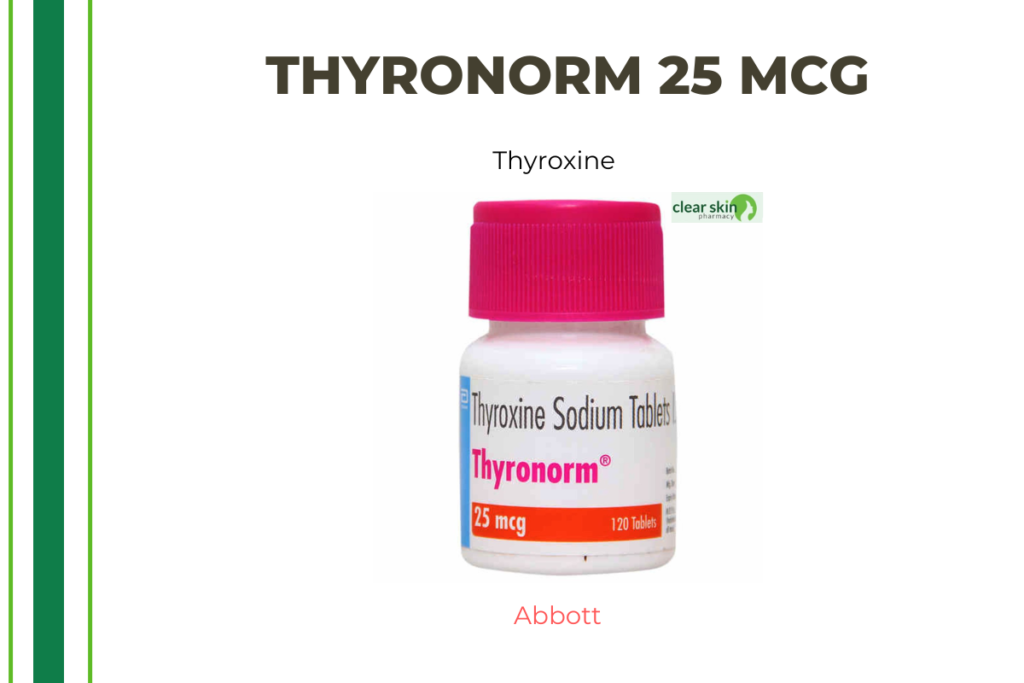
Medicinal Advantages
Thyronorm 25 mcg regulates the activity of the thyroid gland (hypothyroidism) and alleviates symptoms of low thyroid hormones, such as unexplained weight gain, fatigue, and cold sensitivity. Consequently, it aids in the restoration of the body’s natural thyroid hormone, which is essential for mental and physical health. In contrast, Thyronorm 25 mcg should not be used to treat obesity or weight loss.
Use Instructions
This medication should be taken once daily, half an hour before breakfast, on an empty stomach, with a full glass of water. If you have any concerns about taking Thyronorm 25 mcg, you should consult a physician.
Storage
Place in a cool, dry area out of direct sunlight.
Thyronorm 25 mcg Side Effects
As with other medications, Thyronorm 25 mcg might cause side effects, however not everyone will experience them. Incorrect dosage and irregular administration are the most frequent causes of adverse consequences. Possible adverse effects include palpitations, muscle spasms, headaches, anxiety, irritability, sleeplessness, tremors, muscle weakness, increased hunger, weight loss, diarrhea, heat intolerance, menstrual irregularities, and skin rash. When taken in the dosage prescribed by a physician, these undesirable side effects are rarely experienced. However, if these symptoms persist, you should visit a physician.
Drug Recommendations
Among other items, soybean flour, cottonseed meal, cabbage, cauliflower, walnuts, dietary fiber, calcium, and calcium-fortified beverages may interfere with the operation of Thyroxine. Therefore, if possible, avoid consuming these foods within several hours of your dose. Thyronorm 25 mcg should not be administered to individuals who have had an acute myocardial infarction or who have hypertension. Before taking Thyroxine, you must have your heart function closely examined by a physician. Long-term use of Thyronorm 25 mcg can cause osteoporosis and a higher risk of bone fractures. In order to preserve bone health, your doctor may prescribe calcium or vitamin D supplements in addition to Thyronorm 25 mcg. Thyronorm 25 mcg should not be used for weight loss goals alone. Individuals with diabetes who take Thyronorm 25 mcg may encounter alterations in blood glucose control, necessitating the use of additional antidiabetic medications or insulin. Thyronorm 25 mcg is not recommended for weight loss or thyroid cancer treatment.
Interactions Between Drugs
Thyronorm 25 mcg interacts with appetite suppressants (phentermine), treatments for acid reflux (esomeprazole), anti-diabetes medications (metformin), calcium/vitamin D, and neuro-related pharmaceuticals (amphetamine/dextroamphetamine). Consult your doctor before using Thyroxine if you are taking any of these drugs.
Inform your physician if you are using any homoeopathic, ayurvedic, Unani, or over-the-counter drugs. These medications may interact with Thyronorm 25 mcg and reduce its efficacy. Foods such as soybean flour, cottonseed meal, walnuts, dietary fiber, calcium, and beverages fortified with calcium may further inhibit the absorption of Thyronorm 25 mcg. Therefore, if at all possible, avoid these meals.
Thyroid hormones raise the heart’s workload and the body’s oxygen demand. Disease-Drug Interaction: Thyroid hormones raise the heart’s workload and the body’s oxygen demand. Patients with cardiovascular diseases such as high blood pressure, chest pain (angina), and coronary artery disease should therefore use Thyronorm 25 mcg with caution. Your heart function should be evaluated frequently. If chest discomfort occurs frequently, consult your doctor about reducing your dosage.
Cautionary Note
ALCOHOL
Alcohol use should be avoided when taking Thyroxine to reduce the risk of adverse effects.
PREGNANCY
Only take Thyroxine if prescribed by your doctor. Due to rising oestrogen (female sex hormone) blood levels, the need for Thyroxine may increase during pregnancy; therefore, thyroid function should be evaluated routinely during and after pregnancy. Your physician can adjust the dosage of thyroid hormone in this situation.
BREAST FEEDING
Even with high doses of thyroxine, the amount of thyroxine that gets into breast milk during breastfeeding is extremely low, making it perfectly safe. If you have any doubts, though, you should seek medical guidance.
DRIVING
The hormone thyroxine has little impact on driving ability.
LIVER
Because there are no known interactions with thyroxine, see your physician if you experience any side effects.
KIDNEY
Because thyroxine has no impact on the kidneys, the prescribed dosage is permissible. Patients with an adrenal gland disorder or complication should consult a physician prior to administration.
No habit formation
Advice on Diet and Lifestyle
You can reduce your symptoms and improve your thyroid function by consuming the proper foods and taking your prescribed medications as directed. Patients with hypothyroidism benefit from iodine, zinc, and selenium. In contrast, iodine and selenium supplements should only be taken if prescribed by a physician.
In hypothyroidism, calcium (hypocalcemia) and vitamin D are frequently lost. In this case, individuals with hypothyroidism should adopt calcium-rich diets.
Those with hypothyroidism typically have a slower metabolism, so consuming more protein may help speed it up.
Yoga and aerobic exercises may help to increase the daily metabolism.
People with hypothyroidism should consume more fruits, vegetables, and lean proteins. These low-calorie meals could prevent weight gain.
Goitrogens are found in soy foods (tofu), cabbage, broccoli, kale, cauliflower, spinach, sweet potatoes, cassava, peaches, strawberries, millet, pine nuts, and peanuts, among others.
Recommendations
Significant or life-threatening poisoning symptoms may result from excessive dosages. Therefore, if you forget to take Thyroxine, take it as soon as you remember. If your next scheduled dose is approaching, you should skip the missed dose and continue taking your medication as prescribed by your doctor.
Thyroxine should not be used to treat obesity or assist with weight loss.
If you have adrenaline or pituitary gland issues, heart disease, diabetes, or coagulation disorders, you should not use thyroxine without first consulting a physician. Your dosage may require modification.
Before beginning this medicine, patients with diabetes who are currently taking Thyroxine should consult with their physician, since it may impair glycemic control and need the use of other anti-diabetes drugs or insulin.
Supplemental thyroxine may decrease bone mineral density, particularly in postmenopausal women. Consult your physician about the lowest effective dose for your bone health.
Before undergoing surgery, please advise your doctor if you are using Thyroxine.
Normal thyroid function tests are performed on an empty stomach after a six- to eight-hour fast.
Additional Information : This item is non-refundable.
Glossary of Diseases and Conditions
Hypothyroidism, also known as underactive thyroid, is a condition in which the thyroid gland does not generate sufficient thyroid hormones to meet the needs of the body. When thyroid hormone levels are low, the body’s functioning and metabolism slow down. Hypothyroidism is characterized by fatigue, increased sensitivity to cold, constipation, dry skin, unexplained weight gain, bloated face, hoarseness of voice, and muscle weakness. Some patients with hypothyroidism may develop calcium and vitamin D deficiencies.
FAQs
Depending on your age, gender, and health, your thyroid hormone levels may fluctuate (like pregnancy, chronic condition or complication). TSH levels in a 30-year-old woman may be roughly 4.2 mU/L, whereas they may reach 8.9 mU/L in a 90-year-old man. In addition, your stress level, diet, medications, and menstrual cycle can influence your thyroid hormone levels. Use the following range as a rough guide: -A normal TSH range is between 0.4 and 4.0 mIU/L. The typical range for T3 levels is between 0.2 and 0.5 ng/dl. -A typical T4 level should range from 0.8 to 1.8 ng/dl.
You should seek medical assistance if you have sudden weight gain, fatigue, increased sensitivity to cold, dry skin, constipation, a puffy face, muscle weakness, anxiety, or hoarseness in your voice. Consult with an Endocrinologist/Physician for continuing treatment.
While taking thyroxine, food should not be consumed. Please take it on an empty stomach at least 30 minutes prior to your morning tea/coffee/breakfast.
You should have a thyroid profile test that includes T3, T4, and TSH levels performed each month. Regular use of Thyroxine as prescribed by your physician will result in a decline in your TSH level.
Thyroxine is utilized solely for the treatment of hypothyroidism, not for weight loss.
You should seek medical assistance if you have sudden weight gain, fatigue, increased sensitivity to cold, dry skin, constipation, a puffy face, muscle weakness, anxiety, or hoarseness in your voice. Consult with an Endocrinologist/Physician for continuing treatment.
Reduce your salt intake to fewer than 2300 mg per day. When you consume excessive amounts of salt, your blood pressure increases, particularly if you have an underactive thyroid.
Based on the thyroid profile test, an Endocrinologist may advise a pregnant woman to take a high dose of Thyroxine to satisfy the high demand for thyroid hormone. During pregnancy, it is crucial to treat an underactive thyroid, as low levels of thyroid hormone in the mother might harm both the mother and the fetus.
If you miss a Thyroxine dose, you should not take a double dose. If you take too much Thyroxine, you may have anxiety, insomnia, a modest rise in temperature, an increase in blood pressure, or loose stools. In this scenario, you should immediately contact your physician and only take the medication with his or her approval.
Hypothyroidism and other endocrine disorders are typically lifelong conditions. Stopping the drug on your own may cause an imbalance in the body, which might result in serious metabolic issues.

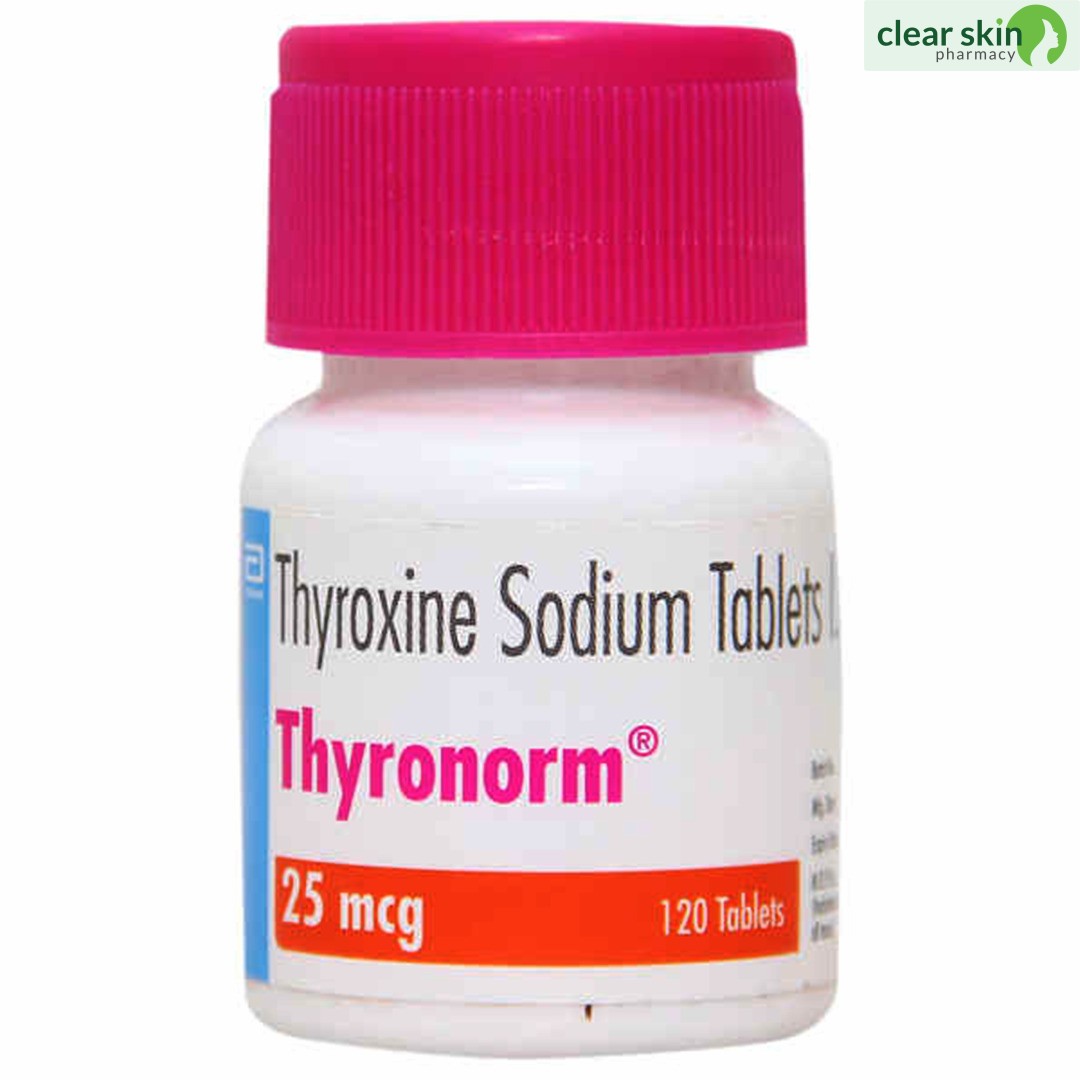
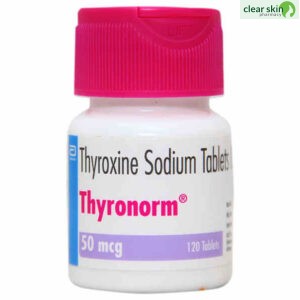
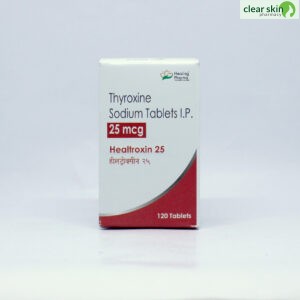
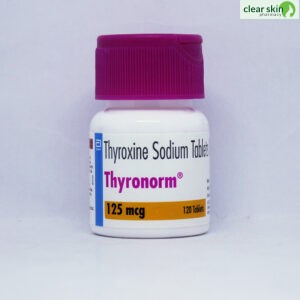
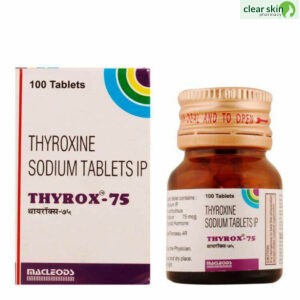
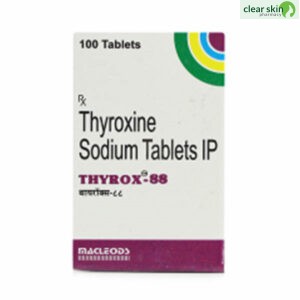
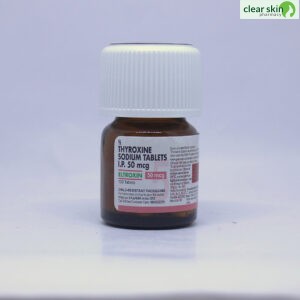
Be the first to review “THYRONORM 25MCG 120 tablets”